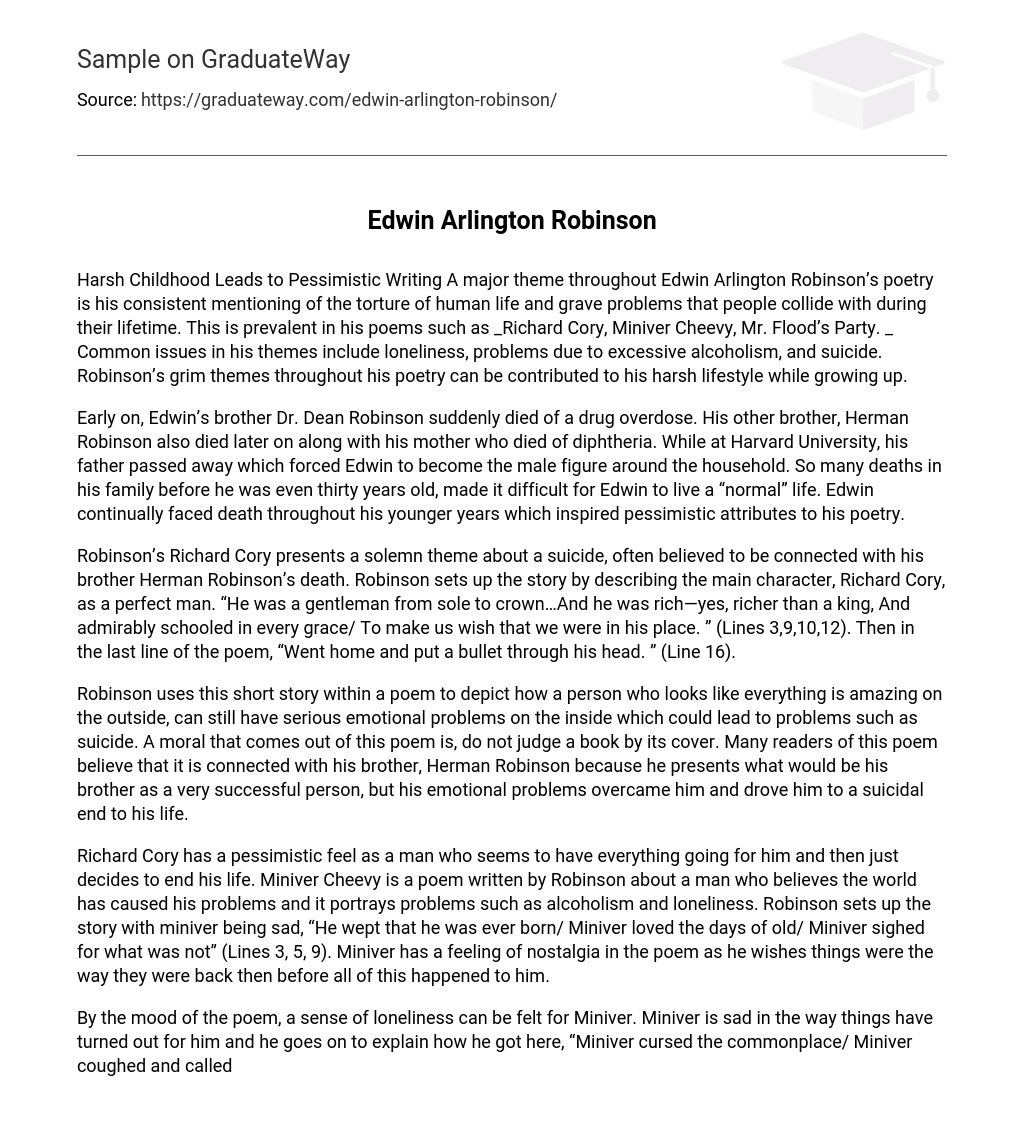Edwin Arlington Robinson frequently explores the distress and profound difficulties encountered by individuals throughout their lives in his poetry. This recurring motif is evident in his works such as “Richard Cory,” “Miniver Cheevy,” and “Mr. Flood’s Party.” Loneliness, the consequences of excessive alcohol consumption, and suicide commonly emerge as key concerns in his verses. It is plausible to attribute Robinson’s somber thematic choices to the challenging experiences he endured during his formative years.
Early on, Edwin’s brother Dr. Dean Robinson suddenly died of a drug overdose. Later on, his other brother, Herman Robinson, also passed away along with his mother who died of diphtheria. While at Harvard University, his father also passed away, forcing Edwin to assume the role of the male figure in the household. These numerous deaths in his family before he even turned thirty years old made it challenging for Edwin to lead a “normal” life. Facing death repeatedly during his youth heavily influenced the pessimistic nature of his poetry.
Robinson’s Richard Cory delves into the somber topic of suicide, often believed to be linked to his brother Herman Robinson’s death. The poem begins by portraying the protagonist, Richard Cory, as an impeccable man. “He was a gentleman from sole to crown…And he was rich—yes, richer than a king, And admirably schooled in every grace/ To make us wish that we were in his place.” (Lines 3,9,10,12). However, the poem concludes with the tragic revelation that Richard Cory “Went home and put a bullet through his head.” (Line 16).
In this poem, Robinson utilizes a short story to illustrate the concept that outward appearances can often mask inner emotional turmoil, potentially resulting in tragic outcomes like suicide. The central moral conveyed by the poem is the importance of not passing judgement solely based on superficial appearances. Many readers of this poem associate it with Robinson’s brother, Herman Robinson, as he portrays someone who outwardly appears to be highly accomplished but ultimately succumbs to emotional struggles, leading to his decision to end his own life.
Richard Cory and Miniver Cheevy are two poems written by Robinson. Richard Cory explores the pessimistic theme of a man who seemingly has everything in life but still chooses to end his own life. On the other hand, Miniver Cheevy portrays a man who blames the world for his problems, highlighting issues like alcoholism and loneliness. Robinson introduces Miniver as a character filled with sadness, expressing his yearning for the past, saying “He wept that he was ever born/ Miniver loved the days of old/ Miniver sighed for what was not” (Lines 3, 5, 9). Through his nostalgic perspective, Miniver longs for things to be as they were before his life took a turn for the worse.
The poem evokes a feeling of loneliness for Miniver, who is sorrowful about his circumstances. He explains the reasons for his current situation by saying, “Miniver cursed the commonplace/ Miniver coughed and called it fate” (Lines 21 and 31). At first, Miniver points fingers at the world for his misfortunes, but then he realizes that they were meant to happen because of fate. Miniver Cheevy is a name that signifies an underachiever, but after Robinson writes, “And kept on drinking.” (Line 32), any sympathy one may have felt for Miniver disappears upon learning that his excessive drinking is what led to his downfall in life.
The poem suggests another moral: alcohol is detrimental and can greatly disrupt one’s life. “Mr. Flood’s Party,” another poem by Robinson, also conveys a pessimistic theme of loneliness and alcoholism. Robinson initially depicts the solitude of the character Eben, stating, “Old Eben Flood, climbing alone one night/ Alone, as if enduring to the end/ he stood in the middle of the road.” (Lines 1, 17, 19). The title implies a party taking place amidst Eben’s isolation, further highlighting his loneliness.
The poem conveys Eben’s melancholic perception of his life through the arrangement of words. Additionally, Robinson exacerbates the situation by having Eben attempt to drown his sorrows on multiple occasions, as evidenced by the lines “Drink to the bird/ the jug he had gone so far to fill/ We had a drop together/ he raised the jug again regretfully” (Lines 13, 14, 36, 51). Just like in Miniver Cheevy, Robinson employs alcohol to further worsen the protagonist’s circumstances. The frequent mention of drinking beer implies that Eben is a heavy consumer of alcohol.
The poem implies that Eben’s alcoholism worsens his loneliness. Robinson states, “There was not much that was ahead of him/ And there was nothing in the town below/ where strangers would have shut the many doors/ that many friends had opened long ago” (Lines 53-56). Essentially, Eben feels isolated because people no longer want to interact with him due to his excessive drinking. This emphasizes the significant impact alcohol can have on a person’s life and how others perceive them. This poem, like many of Robinson’s works, carries a prevailing sense of negativity but also delivers a moral message.
There is a clear connection between the life story of the poet and the morals depicted in his poetry. It seems that through his poems, he aims to prevent others from making the same mistakes he did in the past. His poetry often deals with the negative effects of alcoholism, which personally affected him. Moreover, the prevalent theme of loneliness in his works stems from the absence of family members. By age thirty, he had already lost his mother, father, and several siblings, leaving him isolated.





